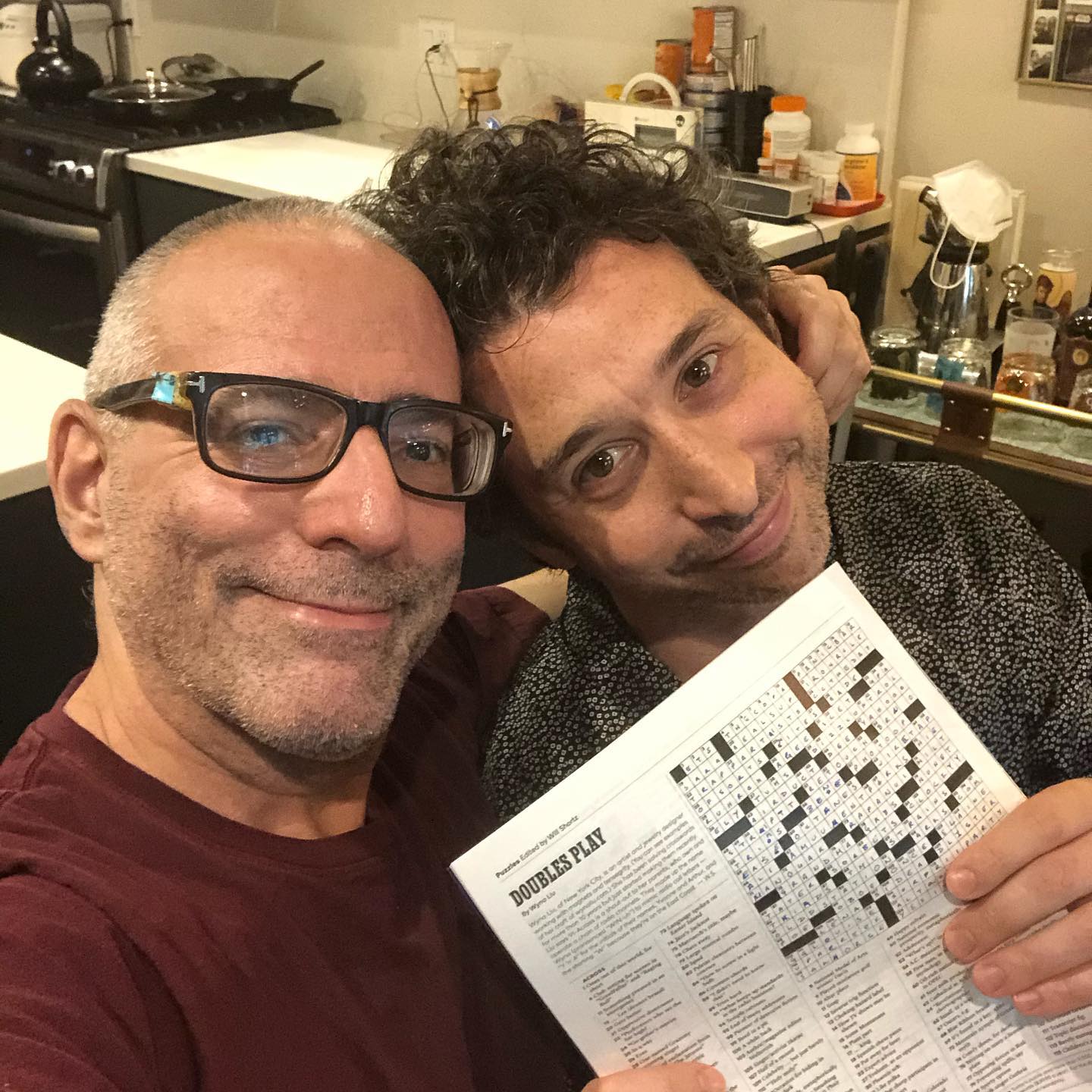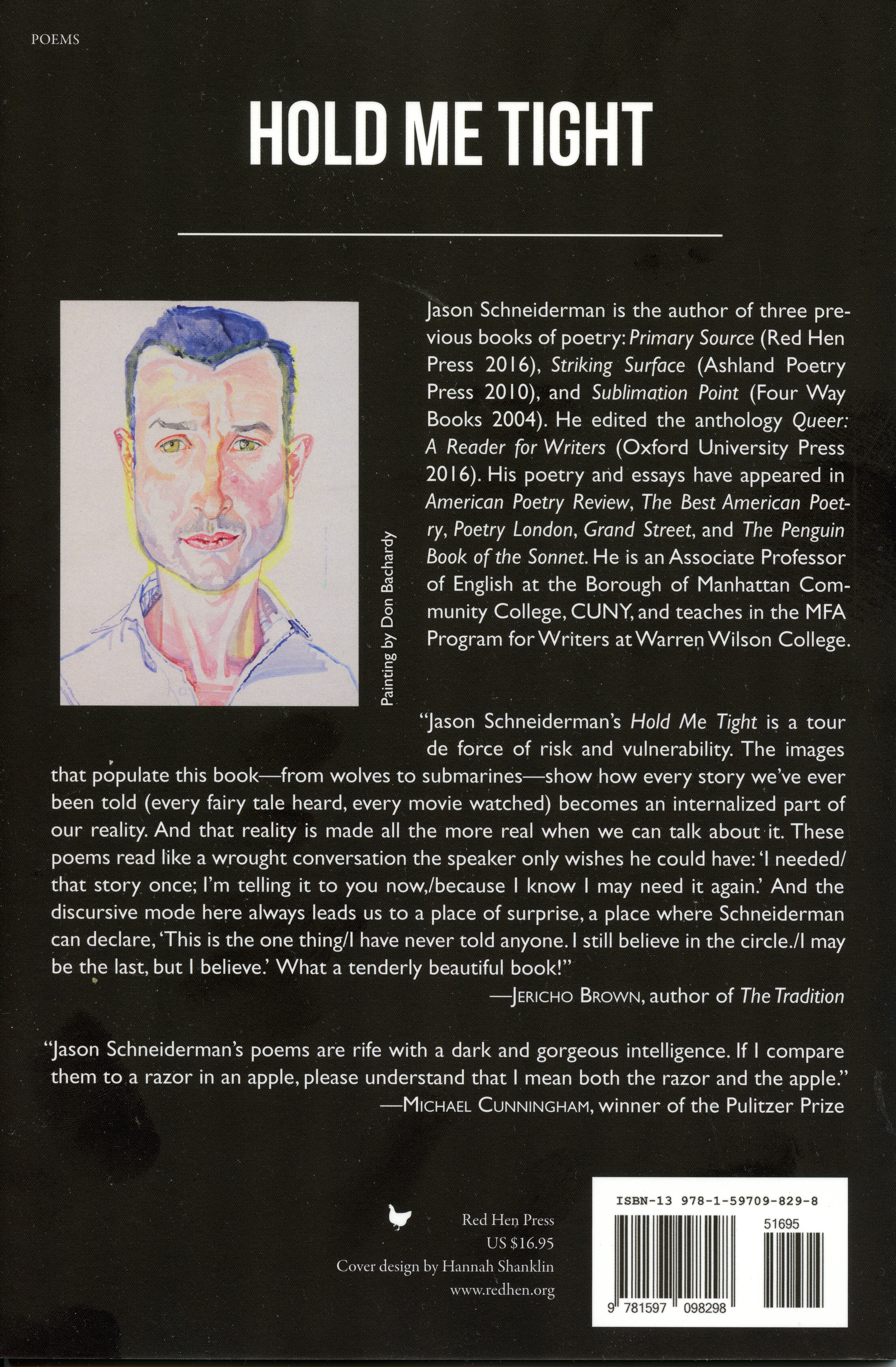…
Jason Schneiderman’s new book, Hold Me Tight, has some striking violence on its cover yet is very comfortable to hold. It’s this oxymoron about the book that pleases me the most. Pleasing too is the fluid order of the poems, a past, present and future that make perfect sense and give the poems the span of a lifetime that starts with Aesop and fairy tales, morphs into questions about art and the Internet, and ends with the end of things, last poems that are, Jason says, “hopeful elegies so that you can love things before they are gone.” Hold Me Tight is easy to read because when you hold it, it holds you in a conversation that is funny, intelligent, at times profound, and loving too.
…
Here are four poems from Hold Me Tight that Jason Schneiderman doesn’t read on the Vimeo. Enjoy.
…
OK, Earth.
I’ll learn to love rot.
I’ll learn to love things
that are rotting. I’ll learn
to see that in many kinds
of death there are also
kinds of life, and I’ll learn
to see that life and death
are interdependent.
I’ll learn to compost,
and I’ll learn to love
composting. I’ll learn
to love fertility, although
it is something I will never
achieve, until I myself
am fertilizer. I get it,
Earth. I was never as sterile
as I thought. I saw myself
as one thing, but I was
another. I was looking out
from my body, so I couldn’t
really see my body. But still,
Earth, is it OK if I keep
loving sterility too?
Is it all right if I still love
clean white surfaces?
Marble. Porcelain.
I can’t unlove bleached linens,
or a black leather couch,
wiped down. I’ll still love
Glass. Clear glass.
And a man’s sperm,
dying on my chest,
or in my mouth.
I’m going to love that too.
At the core of a nuclear
reactor, under the water,
it glows blue. It’s almost
the same blue as the wall
of a glacier, when cleared
of snow, and polished,
but in the reactor it gives
off its own light,
like an appliance
in my kitchen, in the dark.
It’s a sun, under water,
but blue and deadly
and quarantined,
safe in all respects
except the waste,
the forever lasting waste.
in black capsules,
the opposite of life,
the end of the glow,
anti-fecundity in a color,
the opposite of life,
remainder of what warms you,
or cools you, if it’s summer.
I don’t want to love
that blue anymore.
I want to love the soil,
and the worms.
My best chance
at giving life
to another thing.
My best chance
to survive.
…
…
Americana
You’re all hat and no cattle.
You’re all snake and no venom.
You’re all wood and no lead.
You’re all tar and no feather.
You’re all ranger and no power.
You’re all margin and no center.
You’re all show and no dog.
You’re all speedo and no dick.
You’re all barricade and no protest.
You’re all outbreak and no virus.
You’re all New York and no city.
You’re all box and no Cornell.
You’re all inch and no foot.
You’re all ruler and no measure.
…
…
Writing About ______ in The Age of Google
The firework he rested on his head
killed him instantly when he set it off.
It happened in Maine, in _____.
It was all over the news, and time was,
I would have written about it,
used his name without thinking twice,
quoted the news source, shown
everything. I might have made him
a symbol for something larger,
or imagined his thoughts, made up
a few details, but not now,
when I suspect that the people
who loved him are likely to Google him,
to find what I write. Perhaps this should
always have been the case, that what
I was about to do was to instrumentalize
him, to make his death serve my work.
Perhaps it would have been a good poem.
Perhaps not. Perhaps it would have moved
you, reader. Perhaps not. But now,
it will never exist, to spare
the people who loved him
the chance of stumbling across
my little poem of interpretation,
which I might have titled,
“What _____’s Death Means to Me,”
when the truth is that it means nothing
to me, while to those who loved him,
his life was the center of a universe,
the way every life is the center
of someone’s universe, and every life
deserves to be mourned,
even the lives ended in ways so foolish
as to be, to the unacquainted, laughable.
…first published in Cortland Review
…
…
In Memoriam, Fanny Imlay (1794-1816)
When you ask yourself how people survived
the nineteenth century, before soap and
antibiotics, before anesthesia and electricity,
remember that not all of them did.
Remember Fanny Imlay in her
hotel room, drafting her suicide note
before drinking laudanum. Remember
the inn keeper, who found her corpse,
and tore her name from the bottom
of the note so that she could be buried
in Christian ground. Remember Fanny Imlay’s
final words, offering the blessing of forgetting
that such a creature ever existed, as I
[remainder torn away]
…first published in Bellevue Literary Review
…
…
sugar is smoking
it’s amazing how death
is always around the corner,
or not even so far away
as that, hiding in the little pleasures
that some of us would go
so far as to say
are the only things
keeping us alive
...first published in Academy of American Poets’ Poem-A-Day
…
Hold Me Tight is published by Red Hen Press. You can check it out here:
 Michael Broder and Jason Schneiderman
Michael Broder and Jason Schneiderman
..
..

